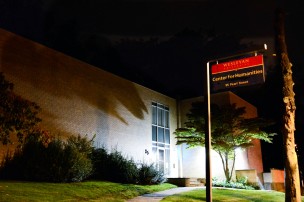The University’s Center for the Humanities (CHUM) recently obtained $6 million in endowment money, coinciding with its celebration of 54 years of scholarship. According to CHUM, Director Ethan Kleinberg, the Center applied for the Andrew W. Mellon Foundation grant in an endeavor to secure its financial future.
“[We wanted to] be able to expand our scope and mission,” Kleinberg wrote in an email to The Argus.
In 2011, the University received a two million dollar challenge grant from the Mellon Foundation that required an additional four million in endowment funds be raised in order to obtain the full grant. With support from alumni, parents, and friends, CHUM was able to raise the necessary funds over the last two years and is now in possession of the full six million.
The Mellon Foundation offers grants in five core areas: Higher Education and Scholarship, Scholarly Communications and Information Technology, Art History, Conservatives and Museums, Performing Arts, and Conservation and the Environment.
“Our grant-making philosophy is to build, strengthen and sustain institutions and their core capacities, rather than be a source for narrowly defined projects,” the Andrew W. Mellon Foundation website reads. “As such, we develop thoughtful, long-term collaborations with grant recipients and invest sufficient funds for an extended period to accomplish the purpose at hand and achieve meaningful results.”
Provost and Vice President for Academic Affairs Ruth Weissman noted the significance of the endowment.
“We are very grateful for the Mellon [Foundation’s] support and the contributions of matching funds by our alumni,” Weissman wrote in an email to The Argus. “The endowment makes it possible to bring in world-class speakers and to support faculty and student fellowships.”
According to a Sept. 16 article in the Wesleyan Connection, these funds will primarily assist with the undergraduate curriculum as well as scholarly research and work. In addition, this funding will support the connection of humanities research to the public.
“It is a very good feeling to be able to play offense at a time when many [humanities centers] and humanities departments are on defense,” Kleinberg wrote. “Hopefully, the commitment that Wesleyan and the Mellon Foundation [have] made to the humanities will serve as an example to other institutions to make a similar commitment.”
Due to this new grant, CHUM is planning on implementing a student research assistant program next year. With this program, all Faculty Fellows will be paired with students to help with their research projects. This program will complement the pre-existing CHUM Student Fellow program.
CHUM Student Fellow Mari Jarris ’14 said that her involvement with the center has provided her with a great opportunity to work on her thesis. She expressed enthusiasm about the endowment and what it will bring for CHUM’s future.
“This new grant will ensure that the fellowship program will continue,” Jarris said.
CHUM also encompasses the Social, Cultural, and Critical Theory Certificate, an interdisciplinary program that encourages students to pursue theory-intensive courses in a variety of departments at the University. Jarris noted that the endowment will expand opportunities for students pursuing the certificate.
“The funding for this certificate comes from CHUM, too, so now we will be able to bring in different speakers and have different events [for the In Theory Lecture Series],” Jarris said.
Kleinberg pointed out that this grant will allow for intense intellectual collaboration between faculty members and students.
“We will certainly continue to build on our longstanding traditions,” Kleinberg wrote. “We will also build up our work and presence in the new media.”
Because of these funds, the center was able to host last week’s conference, titled “Exercising Judgment in Ethics, Politics, and the Law: Hannah Arendt’s ‘Eichmann in Jerusalem: A Report on the Banality of Evil’, Fifty Years Later.” Jarris noted that the center was able to bring in top scholars to speak at this event.
Lucy Britt ’14, another Student Fellow, was enthusiastic about the outcome.
“The Center is an amazing center of learning and critical thinking at Wesleyan,” Britt said. “I think it is great that the CHUM got a grant to fund the recent renovation and to bring in speakers like Susan Neiman for the Hannah Arendt conference or Judith Butler last semester.”
CHUM will also be able to add more programs to its current roster of lectures and conferences. For instance, the center is pushing for more student-run humanities journals and blogs like PYXIS, a print and digital humanities journal.
PYXIS Executive Director Ben Zucker ’15 said that he hopes the journal will be helpful and informative.
“We want the journal to come together naturally through close work with CHUM,” Zucker said. “It is a matter of finding out how to get students involved to bring out maximum coverage and detail.”
The center will also open a new media lab next year. This lab will offer courses in the digital liberal arts. Kleinberg is hopeful that the endowment will allow CHUM to remain a strong presence within the University’s academic community.
“At a time when one hears so much rhetoric about the humanities in retreat, Wesleyan’s Center for the Humanities is pressing forward,” Kleinberg is quoted as saying in the Wesleyan Connection article. “The case for the importance and relevance of the humanities in the 21st century will not be made by pointing backwards to that which has been done, but instead by pointing to that which we are doing.”
The Wesleyan Argus

Comments are closed